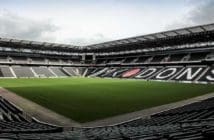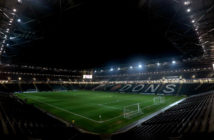Despite the 16 day turnaround from being entangled in a relegation dogfight to plotting a promotion push, Bournemouth’s objective was clear.
It had to be a restoration project, completed and achieved by automatic promotion.
After the prolonged pain of a distorted Premier League season, where the club, players and supporters were plunged into the uncertainty of not knowing, they wanted the next campaign to be cast iron in predictability.
They had good reason, too. Unlike the stereotypical relegated club facing a stereotypical Championship season, crashing out of the top flight did not bring the suspected hammer to proceedings. Relegation had not shattered the squad or bludgeoned its way to ripping the foundations.
Those foundations, largely the composition of the squad, still contained an array of riches and talent, ranging from players who had previous in cutting their teeth at that level and others who were eminently suitable for international level. Heading into their first game of the campaign, 48 days removed from Premier League condemnation, Bournemouth still had the likes of Jefferson Lerma, Lewis Cook, Philip Billing, David Brooks, Arnaut Danjuma and Josh King.
With such a short changeover between seasons, owner Maxim Denim opted against extravagant changes. Eddie Howe, their greatest ever figure, had left. So, perhaps in an attempt to cling onto Howe, but not Howe, they appointed the next best thing. Decisions were kept in-house and were expected to precipitate a smooth transition in management. Jason Tindall, who like his predecessor and long time colleague, was believed to also bleed cherry red. Tindall would now ditch the tracksuits for more formal attire.
Bournemouth’s squad was bloated but increasingly packed with depth – surely perfect for a COVID-condensed, injury fragmented season.
But here we were on Monday night. A lorry load of managerial applicants and indeed a manager later, not to mention £80 million in player sales, Bournemouth faced three successive do or die games. Fans were back, clad in masks but unable to hide their palpable excitement.
They were 270 minutes away from where they wanted to be all along. Since this amount of fans were last here, the club’s situation has changed considerably. Over the past 18 months, the Bournemouth ideology has swerved off course, straying away from their the development-based approach. All of it had been exchanged for short term results and short term success. On Monday evening, supporters came home and straight into the cauldron of a play-off semi final. The situation now is clear – it is Premier League or bust.
Free-flowing Bournemouth, famed for their fabled expansivity, became a much more pragmatic entity under a coach no one, not even the chief executive, planned for (or probably wanted).
Despite the widely castigated appointment of Jonathan Woodgate as interim head coach, Bournemouth won 11, drew two and lost three of his first 16 league games. Invariably, the target of automatic promotion was dashed immediately, but Woodgate did secure a top-six spot with three games to spare.
Football with fans is different. Those who have experienced both sides of the coin will concur. For Woodgate and his players, the return of supporters came at the most lucrative time. With Bournemouth’s tendency to start fast, to only then fall into a deep state of malaise and sporadic bursts for the next 80 minutes, against Brentford, supporters ensured the foot kept straight down on the pedal.
It was a game stoked with mini flames waiting to burst into full fire. There was a sense of desperation in both side’s play, an over exuberant urgency to go from A to B and then to stop B going back to A. Each venture into the opposition third was met with either deep breaths or deep roars. The bombastic nature of the weather conditions only added to the drama.
Promotion is not just a desire for Bournemouth, it’s a necessity. With finances precarious and the prospect of a second successive season in the Championship, tension reached boiling point on Monday evening.
Despite securing £80 million pounds back from the sales of the likes of Nathan Ake, Callum Wilson and Aaron Ramsdale, the cash windfall did little to abate the sense of uncertainty when peering into the club’s financial accounts. At the start of the summer window, Bournemouth’s board made it clear to Jason Tindall that they could only operate through the use of the loan market.
“Every manager up and down the country would anticipate a little bit of that (money) to start to build their own team,” said Tindall in April, two months after being sacked. The former Cherries boss remains adamant he shouldn’t have been let go, but the accrued £80 million barely touched the sides when it came to covering the costs of Bournemouth’s unrestrained spending spree during their Premier League stay.
The money received from the Manchester City for Ake was to protect the sustainability of the club. Since promotion to the Premier League in 2015, in various efforts to punch above their weight, money was profligately used.
It had finally caught up with them. Player sales was the only way to put a dent into the mounting, potentially crippling loss of revenue. The pandemic only exasperated the issue. COVID-19 is understood to have cost Bournemouth in the region £30 million in lost revenue. Additionally, further damages incurred this season, when the club lost up to £6.5 million of future income after their shirt sponsor M88 was investigated by the UK Gambling Commission.
In truth, alarm bells started ringing long ago. Last season, Bournemouth topped the Premier League table for wage to turnover ratio. Essentially, this represents how much of their generated revenue is being spent on player wages. Their most recent accounts, published on June 30 2020, showed 113 percent of their generated revenue was going to players. Naturally, that figure punctuates an unsuitable business model. In 2019, the wage to player turnover ratio was at 85 percent; still a menacingly high, accountant-trembling figure.
To put the significance of this percentage into dangerous perspective, only last week did Inter Milan CEO Giuseppe Marotta state no business, in any sector, “can carry on with a wage bill turnover ratio that is 60-70 percent.” Bournemouth’s wage bill turnover ratio had been 33 percent more.
Bournemouth’s lack of advancement when it came to facilities and possessing commercially viable entities, such as a fully-fledged top division stadium, has always been a burden, particularly when trying to elevate their total income. During their final two seasons in the Premier League, Bournemouth had accrued the least amount of money of any side. In 2019, they raised £131.1 million. A year later, in a COVID-ravaged set of accounts, that total fell to £95.4 million.
This meant that in one financial year, between June 30 2019 and June 30 2020, they had lost £35.7 million pounds out of their annual income. When it comes to salary correlation, only three million less was spent on player wages (from £110.9 million in 2019 to £107.9 million in 2020). So while there is a decrease in the overall wage sum, it was not enough to supplement the loss of nearly £36 million in income.
Relying on the generous pockets of owner Maxim Denim in continuing to hand out money has been and still is, essential. But when the club appears to be on the brink of haemorrhaging it all, an aloof owner persisting with dipping into his pockets to meet the club’s shortfall will eventually prove overwhelming. It is believed that since Denim began to put money into Bournemouth in 2011, he has invested £160 million.
It’s perhaps no wonder Denim’s statement at the end of last season – his first one since gaining promotion – intimated a rush to return to the top flight of football. In spite of Eddie Howe’s departure, a farewell that left one player admitting “it felt like a death in the family”, Denim wrote an open letter to supporters, refusing to admit this was the end of Bournemouth’s Premier League tale.
“I don’t want the past five years to merely be memories that fade over time,” Denim said. “I want to create new memories that match and better the ones that have gone before.”
The impact of the pandemic has also contributed to the paused construction of plans to build a new training ground at Canford Magna, worth £35 million. Building work was delayed due to the pandemic but since construction work is now able to go ahead in the UK, Prost International understands there are no immediate plans to restart the project.
According to the club’s latest set of accounts, there are 621 staff working for Bournemouth, a somewhat bloated number for any Championship or indeed some Premier League, outfits. Failure to go up this season will ultimately lead to cuts being made and alterations made to next year’s budget. Streamlining playing staff and more significantly, off field staff would be the most likely and least time consuming way of nullifying considerable losses. Parachute payments notwithstanding, the prospect of another season in the Championship remains precarious.
If Bournemouth can make use of their 1-0 lead from the first leg and then go on to win at Wembley, promotion would be worth a minimum £135 million in additional revenue. Football is about success and failures and how both are so closely intertwined but yet so vast in emotions. For Bournemouth, success is simply a must this season.
“We hope to see you in a few weeks at Wembley,” said Mike Botter, the club’s stadium announcer. The 6000 fans began to filter out, each one knowing the importance of Monday night.
Follow us on Twitter @ProstInt
![Prost International [PINT]](https://prostinternational.com/wp-content/uploads/2021/08/PINTtFontLogoRoboto1536x78.jpg)


